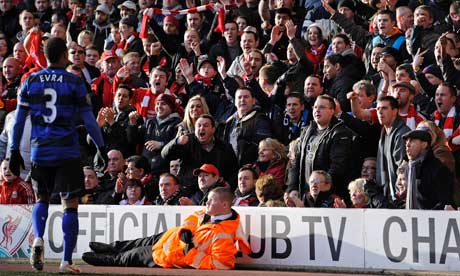
For Patrice Evra, the most distressing part of the match had nothing to do with the incessant booing that followed him around the pitch or the chants reminding him that, as far as the Kop is concerned, he may as well take that report from the Football Association and drop it in the nearest wastepaper bin.
It was that moment when the volume had actually started to go down and it was beginning to feel as though Luis Suárez would be required to hold his nerve at Old Trafford twice in the space of three or four days in February.
It was only a passing heartbeat in which Evra found himself the wrong side of Dirk Kuyt, but it was vital. Kuyt buried his shot and, a few minutes later, the final whistle had gone and Manchester United's forlorn No3 could be seen tossing his captain's armband on to the pitch. Evra had not flinched during the barrage of insults that came in his direction but, as he made his way to the tunnel, his body language was of a man who knew the consequences of that split second.
"There's only one lying bastard," the Liverpool supporters had sung, loud and impassioned. United's supporters responded with: "Always the victim, it's never your fault." The banner unfurled in the away end read: "MUFC defending titles, LFC defending racism." Back and forth it went. Yet, overall, Evra's ordeal centred on his mistake and this was not the day some had feared. Afterwards, Kenny Dalglish talked of the way the teams had "maintained dignity and respect and concentrated on the football".
Only one player, Rafael da Silva, went into Mike Halsey's notebook and it was hardly a foul laced with malice. Halsey had a fine afternoon when it comes to refereeing in a manner that takes into account how one poor decision could alter the mood. The players, as Dalglish pointed out, also deserve credit because this was a day when they reminded us, whatever wars are being fought behind the scenes, that footballers are pretty good at just getting on with the business of trying to do better than the other lot and blanking out everything else.
Evra may be hated inside Anfield, but at one point in the second half there was a consoling pat on the head from Jamie Carragher, the man who symbolises everything there is to know about this football club. Not long afterwards, Liverpool had a corner and a supporter on the front row could be seen asking Rio Ferdinand, going through his stretches on the touchline, to move to the side because he was obstructing his view. Ferdinand not only obliged, but offered a little apologetic wave.
These were moments when the mood felt almost tame compared to what is normally expected in these matches, but it was not always like that and the photograph circulating on Twitter of the supporter impersonating a monkey – unless he would like us to believe he was simply scratching his armpits – is depressing in the extreme.
There is also an issue of why a black man who has been called "negro" deserves to be demonised, but, even so, Dalglish was probably entitled to be a little put out when the first question afterwards was whether it was right for Evra to get this treatment.
"Why should I be disappointed for Patrice Evra?" he snapped at his inquisitor. "Have you played football? I've been booed."
Dalglish wanted to focus on his team's second victory over Mancunian opposition in the space of four days. For long spells they had looked as though they missed Suárez's ingenuity in attack. They huffed and they puffed, but it was all a little unimaginative, especially as the United goalkeeper, David de Gea, was having one of those games when he was threatening to be a danger to his own team. Liverpool, however, have shown wonderful competitive strength in beating the Premier League's top two teams in successive matches. They have responded brilliantly to the ordeal of last weekend's 3-1 defeat at Bolton and, on this evidence, the Carling Cup final may not be their only trip to Wembley this season.
As for United, Sir Alex Ferguson will probably now accept it was a mistake to recall De Gea. A close study of Daniel Agger's goal shows he was badly exposed by the six-footers in defence, but it was still poor goalkeeping, to say the least – and the harsh reality is that it has become a recurring theme.
So far this season, De Gea has been at fault, in varying degrees, for goals against West Bromwich Albion, Arsenal, Benfica and Basel, possibly two in the 3-2 defeat to Blackburn Rovers and as many as three in two games against Manchester City. Even if we want to be generous and give him the benefit of the doubt for two or three, there have still been six or seven goals from mistakes – and that is simply far too many in 20 starts. When De Gea signalled he might have an injury, it felt like Basil Fawlty complaining about the shrapnel wound in his knee.
A cup tie against Liverpool was probably not the place for Ferguson to determine whether a 21-year‑old goalkeeper had recovered his confidence. The answer was that he hasn't and, by the end, De Gea, Evra and the rest of Ferguson's players were reminded how Anfield is always the worst place they can lose .

